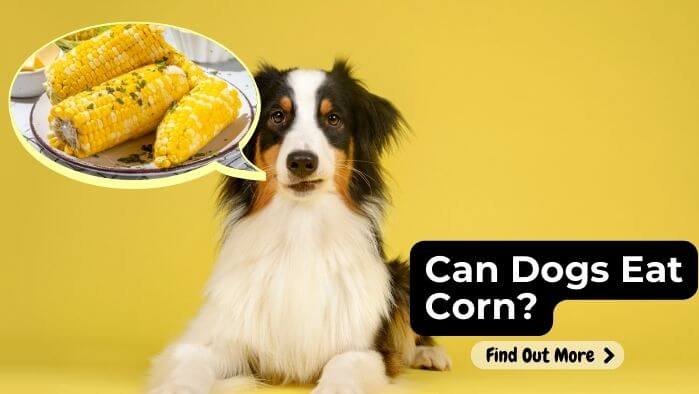Corn, a staple in many human diets, is often a subject of curiosity for dog owners wondering if it’s safe for their furry companions. In this article, we’ll delve into the question: Can dogs eat corn?

We’ll examine the potential benefits, risks, and guidelines for incorporating corn into your dog’s diet.
Understanding Corn
Corn, also known as maize, is a cereal grain that has been a dietary staple for centuries. It comes in various forms, including whole corn kernels, cornmeal, corn flour, and processed corn products like corn chips and popcorn.

Corn is rich in carbohydrates, fiber, and some essential nutrients, making it a popular ingredient in both human and pet foods.
Nutritional Value of Corn
Corn offers several nutritional benefits:
- Carbohydrates: Corn is a good source of carbohydrates, providing energy for dogs to fuel their daily activities.
- Fiber: Corn contains dietary fiber, which supports digestive health and helps regulate bowel movements.
- Vitamins and Minerals: Corn contains vitamins such as vitamin A, and vitamin B6, and minerals like magnesium and phosphorus, which are essential for overall health.
Can Dogs Eat Corn?
While corn is not toxic to dogs, it’s essential to consider the following factors:

- Digestibility: Dogs can generally digest corn well, but some may experience digestive upset if they consume large quantities or have sensitive stomachs.
- Allergies: Corn is a common allergen for dogs, although true corn allergies are relatively rare. If your dog has a known corn allergy, it’s best to avoid feeding them corn to prevent allergic reactions.
- Risk of Obesity: Corn is relatively high in carbohydrates, and excessive consumption can contribute to weight gain and obesity in dogs if not fed in moderation.
Benefits of Feeding Corn to Dogs
In moderation, corn can offer several benefits to dogs:
- Energy Source: The carbohydrates in corn provide dogs with a readily available source of energy, making it suitable for active dogs with high energy requirements.
- Digestive Health: The fiber content in corn can support healthy digestion and regulate bowel movements, preventing constipation.
- Nutritional Variety: Corn can be a valuable addition to a dog’s diet, providing variety and supplemental nutrients when fed as part of a balanced diet.
Risks of Feeding Corn to Dogs
Feeding corn to dogs can pose certain risks:
- Allergic Reactions: Some dogs may be allergic to corn, experiencing symptoms such as itching, skin irritation, or digestive upset after consumption.
- Obesity: Corn is calorie-dense, and excessive consumption can contribute to weight gain and obesity in dogs if not monitored carefully.
- Digestive Upset: Dogs with sensitive stomachs may experience digestive upset, including diarrhea or vomiting, after consuming corn.
Guidelines for Feeding Corn to Dogs
If you decide to feed corn to your dog, follow these guidelines:

- Moderation: Offer corn as an occasional treat or part of a balanced diet, rather than a primary food source.
- Cooked Corn: Cooked corn kernels are the safest option for dogs, as they are easier to digest than raw corn.
- Monitor for Allergies: Watch for signs of allergic reactions or digestive upset after feeding your dog corn. If any adverse reactions occur, discontinue feeding corn and consult your veterinarian.
Frequently Asked Questions About Can Dogs Eat Corn?
Can dogs eat corn kernels?
Are there any risks of feeding corn to dogs?
What are the benefits of feeding corn to dogs?
How should corn be prepared for dogs?
Can corn contribute to obesity in dogs?
Conclusion
In conclusion, corn can be safely included in a dog’s diet as an occasional treat or part of a balanced meal. While it offers nutritional benefits and can be a tasty addition to your dog’s diet, it’s essential to feed corn in moderation and monitor for any adverse reactions.
As always, consult with your veterinarian for personalized dietary recommendations for your dog’s specific needs.